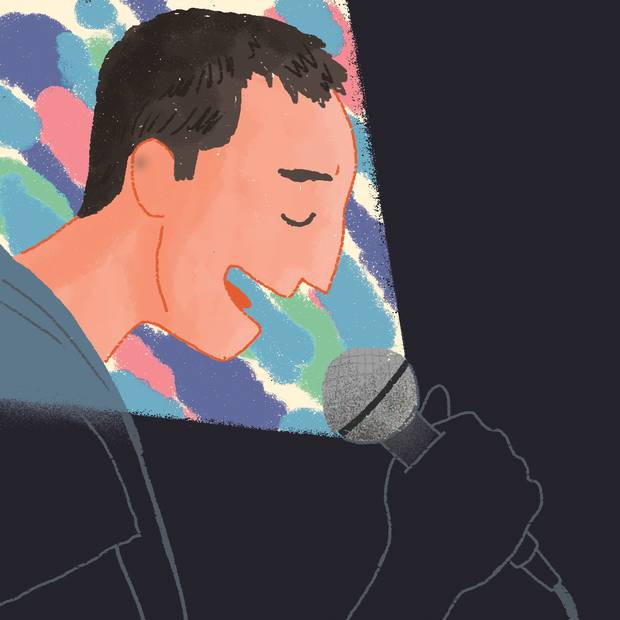Facts & Arguments is a daily personal piece submitted by readers. Have a story to tell? See our guidelines at tgam.ca/essayguide.
Two years ago, my wife of 25 years left me. She walked out and returned to her native Germany. To say the least, my sons, aged 20 and 22 at the time, and I were shocked, but to say we were surprised would be a stretch. She had never gotten over her homesickness.
My friends rallied around, doing what they could to help me through the aftermath. They said all the right things. "We're here for you. Just call if you're feeling lonely." "When can you come for dinner?" "Are you available to do some consulting?" I had been fully retired for a couple of years and my retirement involved spending a lot of time with my wife, both here and in our newly purchased condo in Berlin. So, needless to say, I suddenly had a lot of empty hours to fill and a life to completely re-envision. Once the surge of sympathy and support from my friends subsided, that was what I was left to face – alone.
No matter what people might say, there is no escaping what follows after a marriage breakup. It's like a death. I found that I was overwhelmed by feelings of grief, loss, desperation and fear. I fell into a deep, clinical-grade depression. Not suicidal, but entirely understanding of those who choose that route as a way out. I cried all the time. I was a mess.
But, I was still able to pull myself together when required and I decided that I could not sit at home all day, that I needed to get out. So, I went to lectures. I did some consulting. I saw friends. This kept the black dog at bay, but just barely. Then, one day, I was attending the annual reunion dinner held by my University of Toronto fraternity and happened to be chatting with one of my "brothers" about my situation. This is a fellow with whom I had played some rock 'n' roll music more than 40 years ago and I had heard that he and some other old friends had formed a rock band. I asked if they thought they needed a harmonica in any of their songs and, if so, I was available and able to commit.
Why not? I hadn't played harmonica in years. But when I was still living part of the year in Berlin and looking for things to do, I decided to wipe the cobwebs off my "harps" and find some people to play music with. I found some all right, but, as a person who lived neither in Toronto nor Berlin, I wasn't able to commit the time necessary to join a band properly. Now, however, I could commit.
My fraternity brother said that, actually, they had a number of songs that would benefit from a harmonica, so how about an audition to see if I was up to the task? Mere weeks later, having passed the audition, I was part of a group of musicians, all former fraternity brothers, playing a real gig in a bar as people danced and drank. Being on stage again was scary, but exhilarating.
As time went by and we all became comfortable with each other on stage, I was asked to assume a larger role. I happily agreed. I learned to sing some songs and contribute more than the harmonica and the tambourine. At first, it took a while to get going. My voice wasn't in shape and I had to relearn the classics: Honky Tonk Woman, You Really Got Me, Do Wah Diddy. These days, we can learn a new song in an evening.
As I stood in front of the microphone more and more often, I found that singing was having a transformative effect on me. After every practice, I felt happy, almost light-as-air. I was singing with others and it made me feel very, very good. I could feel the depression lifting. And the music? It spoke to me: "Well it's all right now – in fact, it's a gas!" or "I can see clearly now, the rain is gone."
That should not have come as a surprise. Recent studies have shown that singing, especially singing in harmony with others, is remarkably effective at combatting depression. Indeed, those studies suggest that singing in harmony combats a number of conditions, including Parkinson's and high blood pressure. The body's rewards for screwing up the courage to sing include an outpouring of endorphins (pain relief), dopamine (pleasure, alertness) and serotonin (euphoria, contentment), as well as a reduction in cortisol (signals level of stress).
The corollary benefits of singing in a group are more social. We are not alone; we are part of an organism greater than us, one that we can fold ourselves into. For a brief time, we can dispose of our natural selfishness and bathe in a happy, harmonious experience.
And so, here I am, two years later, finally divorced and getting on with my life. I teach chess to children in the public schools, take care of my sons when they are with me and sing in a rock 'n' roll band called Forty Years After. I think we're pretty good. We seem to be getting more and more gigs and we're certainly having a good time.
If, as Shakespeare says, music be the food of love, then I will play (and sing) on.
Nelson Smith lives in Toronto.
